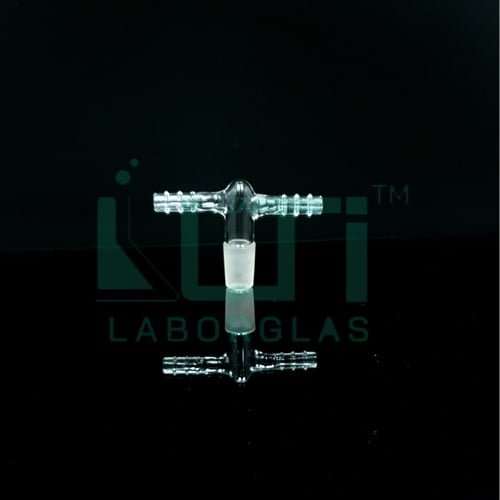Chemical Resistant
| Part No. | MALE Joint | Hose Connection O.D. Inches | Pack QTY. |
| 2300-24M | 24/40 | 3/8 | 10 |
Here are potential uses for such an adapter in a laboratory setting:
- Inert Atmosphere Reactions:
- The adapter may be used in chemical reactions where an inert atmosphere is crucial. Inert gases such as nitrogen or argon can be introduced to create a controlled environment, preventing unwanted reactions with atmospheric oxygen or moisture.
- Inert Gas Injections:
- In reactions requiring the controlled injection of inert gases, the adapter facilitates the introduction of the gas into the reaction vessel. This is common in reactions sensitive to air or moisture.
- Gas Blanketing:
- In processes where materials need to be protected from the effects of oxygen or other reactive gases, the adapter can be used to maintain an inert gas blanket over the sample.
- Solvent Evaporation:
- In processes involving solvent evaporation, the use of an inert gas adapter can prevent oxidation or degradation of sensitive compounds by maintaining an inert environment.
- Sample Storage:
- The adapter may be used in conjunction with sealed vessels or storage containers to ensure the inert gas atmosphere is maintained, particularly for samples sensitive to air exposure.
- Gas Chromatography (GC):
- In GC applications, the use of inert gases as carrier gases is common. The adapter may be used to connect the GC system to gas cylinders containing inert gases.
- Sample Transfer in Inert Environment:
- The adapter can be utilized to transfer samples between different reaction vessels or containers while maintaining an inert environment to avoid contamination.
- Material Synthesis:
- In materials science and synthesis of compounds, the adapter can be employed to introduce inert gases during various stages of the synthesis process to control reaction conditions.
- Laboratory Safety:
- Inert gas adapters can be used for purging or flushing systems to ensure a safe, inert environment before and after certain experimental procedures.






